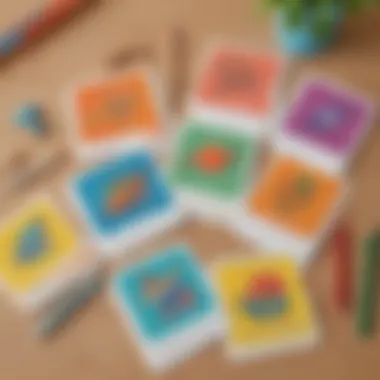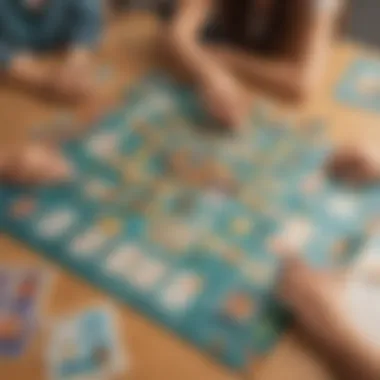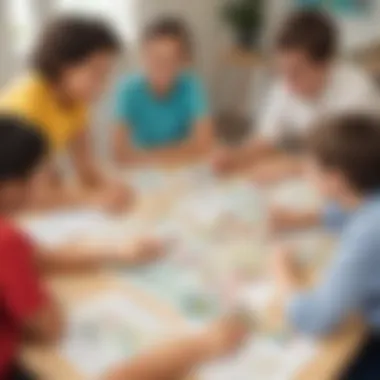Engaging Vocabulary Games for Fifth Graders


Intro
Introducing vocabulary games into the lives of fifth graders can be a game-changer for their linguistic development. As they stand on the brink of more complex reading and writing tasks, engaging them through playful activities is crucial. This section takes a closer look at creative activities and thoughtful quizzes tailored specifically for this age group, ensuring that learning vocabulary remains both enjoyable and impactful.
Creative Activities
Making vocabulary fun often relies on hands-on, creative activities. Kids at this age enjoy putting their crafty skills to the test. Engaging their minds while fostering their creativity is a great way to teach new words.
Craft Ideas
Here are a few craft ideas for kids:
- Word Wall Art: Have children choose their favorite words learned that week and decorate them with colors, drawings, or stickers.
- Vocabulary Puppets: Using socks or paper bags, they can create puppets. Each puppet can embody a vocabulary word, explaining its meaning as they bring it to life.
- Word Trees: Have the children draw a tree and write vocabulary words on different leaves, allowing them to visualize and recall their meanings easily.
Step-by-Step Guides
To further engage in these activities, detailed guides are helpful:
- Creating Word Wall Art: 1. Gather materials - any colored paper, scissors, and markers. 2. Choose words relevant to their studies. 3. Start decorating, focusing on how each word looks and its meaning. 4. Display their art on classroom walls or at home.
- Making Vocabulary Puppets: 1. Collect items for puppet making. 2. Explain what each puppet's vocabulary word means. 3. Practice dialogues with their puppet, emphasizing the meaning of words as they act them out.
- Designing Word Trees: 1. Draw a tree trunk and branches on a large sheet. 2. Cut out leaf shapes from colored paper, each labeled with a vocabulary word. 3. Discuss the meanings as they stick the leaves onto the trunk.
Educational Value
These creative activities do more than entertain; they provide hands-on learning experiences that help solidify vocabulary knowledge. When kids associate words with visuals, they are more likely to remember them. In essence, creating connections through art and play fosters a deeper understanding of language.
Fun Quizzes
Quizzes can supplement creative activities by providing a structured way to reinforce vocabulary. When well-crafted, they can be engaging and meaningful.
Quiz Topics
Top quiz topics that would resonate well with fifth graders include:
- Synonyms and antonyms
- Contextual usage of new words
- Word meanings in different sentences
- Combining words to form new phrases or idioms
Question Types
The types of questions can keep kids on their toes, ensuring the quizzes are stimulating:
- Multiple Choice: Choose the right synonym of the word.
- Fill in the Blanks: Complete the sentences with appropriate vocabulary words.
- True or False: Identify the correctness of vocabulary usage in sentences.
- Match the Words: Align words with their correct meanings or synonyms.
Knowledge Reinforcement
Quizzes help cement learning in a fun, low-pressure environment. They provide immediate feedback and a sense of accomplishment. This knowledge reinforcement builds confidence, which encourages more vocabulary exploration.
Fact-Based Articles
Beyond games and quizzes, integrating fact-based articles into vocabulary education can widen students' knowledge base.
Topics
Articles may cover topics like:
- History topics relevant to their curriculum
- Science experiments with vocabulary relevant to the topic
- Cultural events or stories that ignite curiosity and personal connection to language
Engaging Content
It's paramount that the articles are designed to be engaging. This can be achieved by using relatable situations or storytelling formats. Adding visuals, such as images or infographics, can also hold their interest while explaining complex ideas simply.
Foreword to Vocabulary Games


Vocabulary games hold a special place in the journey of language learning for fifth graders. At this stage, children's cognitive abilities and critical thinking skills expand rapidly, making it the ideal time to introduce engaging ways to learn new words. The significance of vocabulary development cannot be overstated; a rich vocabulary is foundational for effective communication, reading comprehension, and academic success. Especially for fifth graders, laying a strong vocabulary groundwork has long-term benefits.
The Importance of Vocabulary Development
Building a robust vocabulary is akin to equipping a child with a toolkit. When they encounter new ideas or concepts, having a variety of words to express thoughts and feelings is essential. For instance, imagine a child crafting a story. Without a diverse set of vocabulary at their disposal, they might resort to repeating simple words like "nice" or "fun." However, with an expansive lexicon, they can explore terms like "enchanting" or "thrilling." This ability not only enhances their storytelling but also fosters their creativity.
Moreover, vocabulary knowledge is tied closely to reading comprehension. Children who understand more words can grasp and analyze texts more thoroughly. A 2017 study showed that students who engaged in vocabulary games significantly improved their understanding of complex reading materials. Therefore, words are not just building blocks of language; they are keys to unlocking new worlds of understanding.
How Games Facilitate Learning
Games serve as an effective bridge to learning, especially in an educational context. They can transform a tedious vocabulary lesson into an exciting adventure. By incorporating elements of fun and competition, games can motivate fifth graders, making them more likely to engage with the material.
For instance, when playing a word association game, children must think on their feet, associating words quickly. This active engagement helps reinforce connections between terms and promotes retention. Another game, Scrabble, requires players to think critically about word formation, thus enhancing their understanding of spelling and strategy.
"Learning through play has proven to be more effective than rote memorization, particularly for younger learners."
In addition, games encourage interaction among peers, fostering a sense of camaraderie. This social aspect enriches the learning experience, as students learn from each other, share ideas, and push each other to excel. Through these collaborative activities, vocabulary lessons become not only educational but also an opportunity for social development.
In summary, the importance of vocabulary games cannot be overlooked. They are not merely tools for learning; they are essential components of a holistic educational strategy that nurtures language skills in a playful yet effective manner.
Types of Vocabulary Games
Exploring the world of vocabulary games is essential for fifth graders as it opens gateways to enriching linguistic experiences. These games offer more than just amusement; they transform the learning process into an adventure. Each type of game unveils unique ways to enhance vocabulary while keeping students engaged and eager to learn. Whether through word association, puzzles, flashcards, or digital platforms, the significance of these games lies in their ability to promote cognitive growth and foster creativity. Through play, students grasp new words and meanings, laying a strong foundation for effective communication.
Word Association Games
Word association games are a tremendous tool for igniting creativity and conceptual thinking in students. At their core, these games require players to link one word to another, creating a chain of associations. For example, when a student hears the word "dog," they might respond with "bark," and then another student could say "tree" if they think of where a dog might play or rest. This activity not only enriches vocabulary but also cultivates critical thinking and the ability to make connections between concepts. Moreover, this could be spiced up by introducing time limits or scoring points—keeping the competition alive!
Scrabble and Crossword Puzzles
Scrabble and crossword puzzles stand the test of time as beloved classics. Scrabble encourages friendly rivalry, pushing students to think of words that can yield points. It's remarkable how this game cultivates strategic thinking along with vocabulary skills. Meanwhile, crossword puzzles engage learners by presenting clues that stimulate their minds and challenge their existing knowledge. Students often find themselves motivated to learn new words just to complete a crossword grid. Incorporating these types of games into classroom activities can make vocabulary learning feel less like a chore and more like a game of mental agility.
Flashcard Activities
Flashcards are a staple in vocabulary learning, but they can get monotonous if not used creatively. When implemented in engaging ways, they can significantly enhance retention and recall. For instance, students can be grouped to create their own flashcards. Each card can have a word on one side and its definition, picture, or a sentence on the other. Another approach could involve using flashcards in a matching game. Students could pair words with their definitions or synonyms in a race against the clock. Such interactive activities help take the monotony out of studying and make recalling vocabulary terms more enjoyable.
Digital Vocabulary Games
In today’s tech-driven world, incorporating digital vocabulary games into learning is almost a necessity. Online tools and apps provide a variety of interactive methods to learn vocabulary—think of engaging quizzes, animated word challenges, or thematic game nights. Platforms such as Kahoot! or Quizlet allow teachers to create custom games that cater to specific vocabulary lists. Furthermore, these games often come with visual aids or immediate feedback, making the learning experience more dynamic. Using digital resources can bridge the gap between traditional learning and modern technology, making vocabulary practice accessible and appealing to the tech-savvy fifth graders.
Educational Benefits of Vocabulary Games
Vocabulary games are not just a fun diversion; they are pivotal in shaping a child’s language development. In the fifth-grade classroom, these games serve as dynamic tools that cater to diverse learning styles and foster a love for language. Engaging with words through play can help solidify vocabulary acquisition in ways that rote memorization simply cannot. Let's dive into some of the most significant benefits that these games bring to the table.
Enhancing Language Skills
Engaging in vocabulary games can significantly enhance a child's language skills. First and foremost, these games expose children to a broader range of words and their meanings, which is crucial at this developmental stage. When fifth graders participate in a game like Boggle, for instance, they don’t just discover new words; they are also encouraged to think on their feet and make connections between words. This flexibility is essential for developing critical thinking.
Furthermore, vocabulary games often challenge students to use words in sentences or stories. This practical application not only reinforces meaning but also encourages proper usage in context. Ultimately, enhanced language skills prepare children for better communication, both in writing and speaking.
Boosting Memory Retention
Memorizing vocabulary can sometimes feel like a daunting task for students. However, integrating games into the learning process can change the narrative entirely. Games leverage the concept of spaced repetition and interactive learning, which are proven methods for memory retention.
For example, using flashcards in a matching game format allows students to engage with words repeatedly, helping cement their understanding in an enjoyable way. This repetition is often more enjoyable than traditional study methods, leading to a deeper retention of vocabulary. As kids bond over games, they are more likely to remember these words down the road.
"Learning is most effective in a playful environment, where curiosity can roam freely."
Encouraging Collaborative Learning


Vocabulary games create opportunities for collaborative learning, which is vital for social development alongside academic growth. Working together in teams to solve word puzzles or complete word challenges fosters a sense of community among students. They learn from one another, share ideas, and develop their interpersonal skills in the process.
In a game like Scrabble, students not only work on their vocabulary but also learn to strategize and communicate effectively with teammates. Such team dynamics can lead to enhanced problem-solving abilities and a greater appreciation for different perspectives. Moreover, this kind of collaboration promotes a supportive classroom environment where children feel more comfortable taking risks with their language skills.
In summary, incorporating vocabulary games into the curriculum serves as a multifaceted tool that enhances language skills, boosts memory retention, and encourages collaborative learning amongst fifth graders. These educational benefits not only make learning more effective but also ensure that children have fun while they are at it.
Implementing Vocabulary Games in the Classroom
Introducing vocabulary games in the classroom isn’t just a fun twist on traditional learning; it’s a powerful strategy to foster retention, engagement, and critical thinking among fifth graders. When these games are effectively integrated into the curriculum, students are likely to absorb and practice new words in a dynamic way that sticks with them. The key lies in how well these games are woven into the learning fabric of every classroom day.
Creating a Game Schedule
Establishing a game schedule is crucial to harness the full educational potential of vocabulary games. By dedicating specific times each week for these activities, educators signal their importance to students. Consider setting aside a 20-30 minute slot twice a week. During these sessions, students can dive into different games that align with the vocabulary topics being explored in class. This not only makes learning systematic but also builds anticipation.
- Here are some tips for creating an effective game schedule:
- Rotating Games: Keep things fresh by rotating different types of vocabulary games weekly.
- Themed Weeks: Tie games to themes from subjects—like science or literature—to reinforce learning contextually.
- Timing is Everything: Ensure to place these games during times when students are generally more engaged, such as the end of the week or just after a break.
Incorporating Games into Daily Lessons
Integrating vocabulary games directly into daily lessons allows for a seamless blend of instruction and play. Instead of treating games as a separate entity, educators can use them as essential tools for teaching new words or concepts. For example, introduce a new set of vocabulary related to a current history lesson.
- Engagement Strategies:
- Word Relay: Organize a relay race where students must match vocabulary cards to definitions around the classroom.
- Group Challenges: Pair students and let them collaborate on a word puzzle before sharing their findings with the class.
- Real-Life Applications: Encourage students to use new words in daily conversations or writing assignments, reinforcing their learning through practical use.
Assessing Vocabulary Growth
Assessment should never be an afterthought. Regularly tracking vocabulary growth allows teachers to adapt their teaching methods, ensuring students are not just memorizing words but truly understanding their meanings and uses. One method could be to collect students' completion of vocabulary games and evaluate their performance over time.
- Tools for Assessing:
- Vocabulary Portfolios: Have students maintain a portfolio of new words they learn through games, including a definition and an example sentence.
- Quizzes and Challenges: Use quick quizzes or competitions on vocabulary learned from games to gauge retention.
- Reflective Journals: Encourage students to keep journals where they can reflect on which games helped them the most and why.
Assessment doesn’t have to be formal; it can be as simple as asking students to discuss a new word they learned during a game.
By thoughtfully implementing vocabulary games within the classroom structure, schools can provide a rich learning experience that can effectively elevate students' language skills and foster a sense of joy in learning.
Each game and assessment process should add value to both the students’ vocabulary knowledge and their overall educational journey.
Games for Home Learning
When it comes to expanding vocabulary, the classroom isn't the only place where learning can take place. Home learning is equally crucial, as it provides a relaxed atmosphere for creativity and exploration. Engaging in vocabulary games at home not only nurtures a child's language skills but also strengthens family bonds. These games foster a sense of teamwork, encouraging children to collaborate with siblings, parents, or family friends, turning what might typically be mundane practice into a real hoot.
Family Vocabulary Challenges
Family vocabulary challenges are a splendid way to ignite excitement about words. Imagine setting up a weekly contest where family members create their own word lists using a specific theme like nature, animals, or even the grocery list for the week. Everyone can take turns explaining their chosen words, or even better, use them in wacky sentences. This approach encouraged everyone at home to think creatively and embrace new words.
Meanwhile, a simple twist could make the challenge even more exhilarating. Why not add a timed element? Whoever can define or use the most words in a fun sentence within a five-minute countdown could earn a special prize, like picking the next family movie or enjoying dessert first. You'd be surprised how quickly the kids can pick up on the new vocabulary while piercing through the barriers of traditional learning methods.
Online Resources for Home Use
The digital era is overflowing with tools that can enhance vocabulary learning at home. There are numerous online resources tailored for young learners. Websites like Vocabulary.com can act as treasure troves for kids eager to up their word game. They offer engaging activities, quizzes, and flashcards focusing on specific grade-level words, ensuring learners stay on target.
Apps like Duolingo and Quizlet are also worth their weight in gold. These platforms often feature game-like activities that make learning less of a chore. For example, Duolingo's interactive modules blend languages and vocabulary seamlessly, while Quizlet allows you to create personalized quizzes or play games with friends or family.
Furthermore, online platforms like Reddit host communities where parents share tips and resources to keep vocabulary gamified at home. Simply browsing through these forums can spark motivation and introduce fresh ideas based on what works for others in similar situations.
"The more engaging the learning experience, the more room there is for memory to stick. Family challenges and online games deliver on that front by making vocabulary interesting and accessible."


Incorporating these games into daily routines can make vocabulary practice feel less like a chore. Whether it's during a cozy game night or snippets of learning at the breakfast table, these informal moments help solidify language skills in a way that traditional methods sometimes can't reach.
Overcoming Challenges in Vocabulary Learning
Navigating the journey of vocabulary acquisition can resemble hiking through a dense forest; it's not always straightforward and often fraught with obstacles. As we explore innovative vocabulary games, it’s important to address the hurdles that many students encounter. Such challenges can impede their development, but with the right strategies and games, these barriers can be significantly lowered. Fostering an understanding of how to overcome these challenges helps create an environment where vocabulary enhancement becomes a delightful part of daily learning rather than a chore.
Engagement Issues
One significant challenge that teachers and parents face is keeping students engaged. Fifth graders are known for their short attention spans and their tendency to tune out if they're not interested. A lack of engagement not only affects vocabulary acquisition but can essentially turn learning into a monotonous routine. Creating a vibrant atmosphere where learning feels like play rather than work is crucial.
To combat this, utilizing games can capture students' interests, turning tedious learning into exciting challenges. Here are a few approaches:
- Incorporate Technology: Platforms like Kahoot! and Quizlet can make vocabulary practice feel like a competition among peers. Children are usually drawn to screens, so integrating digital games encourages participation.
- Mix and Match Game Types: Using a variety of game formats helps to maintain engagement. Combine interactive activities with traditional approaches to cater to different preferences.
- Set Up Challenges: Having friendly competitions or challenges can boost enthusiasm. For instance, earning points for each new word learned sparks a sense of urgency and excitement.
"Learning through games can turn a child's reluctance into eagerness, fostering a love for words along the way."
By identifying and addressing engagement issues through innovative gaming strategies, educators can help students develop a robust vocabulary while enjoying the process.
Differentiating for Diverse Learners
Every classroom is a melting pot of diverse learners, each bringing their unique backgrounds, strengths, and challenges. While some students may absorb new vocabulary effortlessly, others might struggle significantly. This variation demands a tailored approach to vocabulary games, ensuring every learner finds a pathway to success.
Differentiating vocabulary games involves considering students’ individual needs and preferences. Here are a few effective strategies:
- Level Up the Challenge: For advanced learners, consider introducing more complex words or challenging them with word puzzles that require deeper critical thinking. For those needing more support, simplify the games by using visuals or context clues to aid comprehension.
- Use Multi-Sensory Techniques: Engaging multiple senses can greatly enhance learning. Games that incorporate colors, sounds, or movements cater to various learning styles and help reinforce vocabulary retention.
- Group Dynamics: Pairing or grouping students strategically allows for peer learning. Stronger learners can aid those who are struggling, creating a collaborative atmosphere.
In a nutshell, diversity in learning styles and levels is normal. With flexible approaches to vocabulary games, even the most reluctant learners can flourish. By thoughtfully addressing these challenges, parents and educators can significantly enrich vocabulary learning experiences, ultimately benefiting the students' linguistic abilities.
Future of Vocabulary Learning Games
The landscape of vocabulary learning is shifting, embracing innovative methods that cater to both students and educators. As we explore the future of vocabulary learning games, it’s important to understand how technology continues to shape the way students, particularly fifth graders, engage with language development. Adapting to these changes ensures that learning stays relevant, dynamic, and, most importantly, effective. The integration of new educational tools and methods not only enhances the learning experience but also prepares children for a world where digital literacy is paramount.
Trends in Educational Technology
In recent years, the surge in educational technology has led to the creation of various tools and platforms aimed at enhancing vocabulary skills. Many schools are now incorporating tablets and computers into their daily lessons, which allows for the use of gamified learning apps.
These digital tools often include features like:
- Interactive Quizzes: Games that test vocabulary knowledge through fun and engaging quizzes can be effective. Students can receive immediate feedback, which allows them to adjust their learning strategies accordingly.
- Augmented Reality (AR): Programs that use AR technology transform vocabulary learning into a multi-sensory experience. For example, students can see a word pop up in 3D when they point their device at an everyday object.
- Virtual Reality (VR): Immersive environments where students can explore new words within context not only pique their interest but also enhance memory retention. Think of a game that lets students walk through a virtual neighborhood, encountering words linked to real-life situations.
The Role of Gamification in Education
Gamification is no longer just a buzzword; it's a powerful educational trend. By applying game design elements in non-game contexts, educators can enhance student motivation and participation. Here are some critical aspects of gamification in vocabulary learning:
- Points and Rewards Systems: Assigning points for completed challenges or quizzes encourages students to engage more deeply with the content. These points can lead to rewards, making the learning process feel more like play.
- Levels and Progress Tracking: Like in video games, progress tracking enables learners to visualize their achievements. As students master various vocabulary challenges, they can level up. This function promotes a sense of accomplishment, prompting them to continue their learning.
- Storytelling and Narrative Elements: Integrating narratives into vocabulary games captivates students' imaginations. For instance, a game could involve a character on a quest to collect specific words to defeat a monster, motivating students to learn vocabulary.
Ultimately, the future of vocabulary learning is one that merges technology with pedagogy to create rich, interactive environments. As we continue to embrace these trends, learning will be not just a task but a thrilling adventure.
"Gamification in education isn't just about games. It's about engagement, creativity, and nurturing a love for learning that extends beyond the classroom."
By harnessing the potential of technology and gamification, vocabulary games will continue to evolve, offering children exciting ways to build and expand their language skills. As these methods take foot, we prepare our students for a world where the mastery of language becomes a powerful tool in navigating an increasingly complex landscape.
Ending
The conclusion serves as a pivotal point in understanding the significance of vocabulary games for fifth graders. Throughout this article, we’ve explored how these games contribute not only to vocabulary enhancement but also to overall linguistic development. Emphasizing playful learning, it's clear that engaging students through games cultivates a positive attitude toward language acquisition. This becomes crucial as students transition from the foundational stages of learning to more complex linguistic challenges.
Summarizing Key Takeaways
- Diverse Game Spectrum: The array of games discussed—ranging from traditional word puzzles to modern digital platforms—highlights the adaptability of vocabulary learning to various settings and learning styles.
- Educational Impact: These games do more than amuse; they significantly boost language skills, improve memory retention, and foster collaboration among peers. The inherent competitive spirit and fun lead to deeper engagement.
- Practical Implementation: Simple strategies for integrating these games into daily lessons empower teachers and parents alike. Creating schedules and evaluating vocabulary growth allows for structured yet flexible learning environments that meet the needs of each child.
Encouraging Lifelong Vocabulary Learning
To cultivate a lifelong love for vocabulary, it’s essential to instill these habits early on. When children associate learning with fun, they are more likely to continue seeking knowledge throughout their lives. Parents and educators can help maintain this momentum by:
- Encouraging Daily Reading: Integrating books and interactive reading activities can promote new word exploration in a natural manner.
- Creating Vocabulary Challenges: Family members can engage in friendly competitions or scavenger hunts using new words learned from games, turning learning into an enjoyable group activity.
- Utilizing Technology: Taking advantage of educational apps and online resources can smoothly blend traditional learning with modern methods, catering to the interests of tech-savvy young learners.
The journey of vocabulary acquisition isn’t a race; it's an ongoing adventure. By fostering an environment where learning is embraced and celebrated, we equip fifth graders with a vital tool they can carry through all aspects of life.







